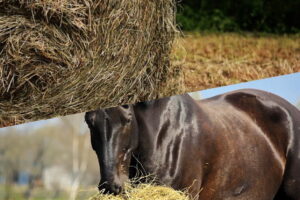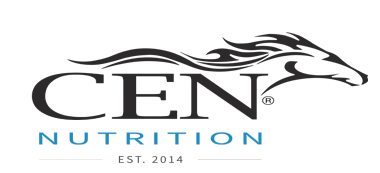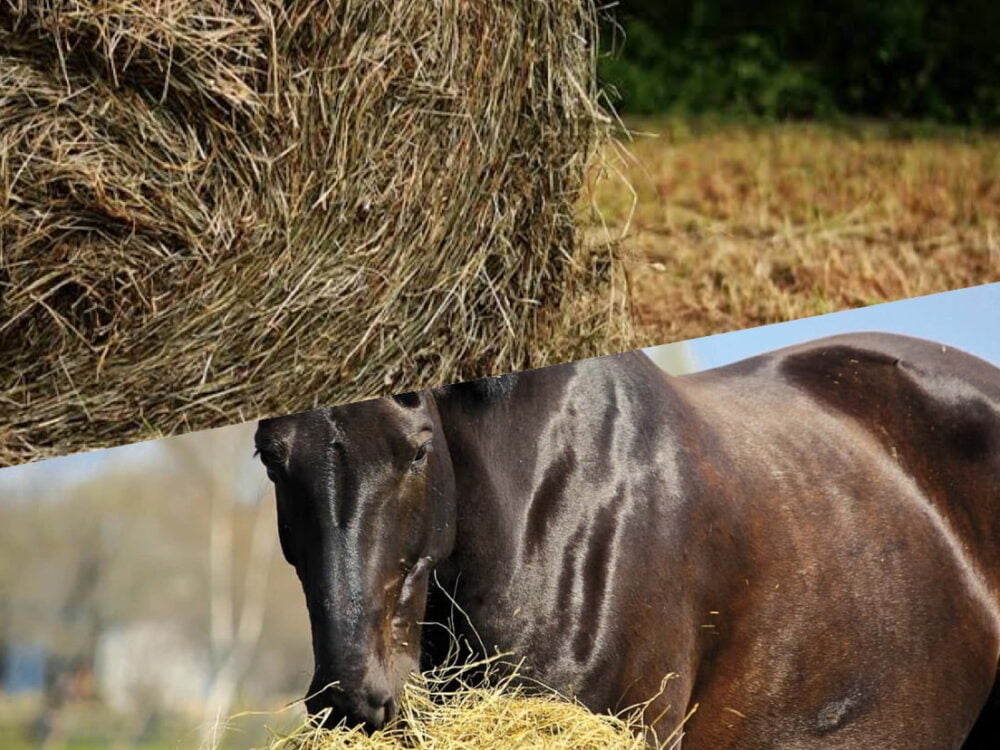 Which Hay Is Healthy, Rhodes, Teff, Lucerne, Meadow or Oaten?
Which Hay Is Healthy, Rhodes, Teff, Lucerne, Meadow or Oaten?
What are the types of hay for horses?
Which is the best type of hay for horses?
WHICH HAY IS HEALTHY? RHODES, TEFF, LUCERNE, MEADOW OR OATEN?
Due to current drought conditions in parts of Australia, access to ANY hay type is important for most horses (except metabolic horses which high sugar + starch hay needs to be avoided).
It is the chewing & digestion of the roughage that satisfies a horse’s inbuilt natural drive to graze continuously, helping neutralise the rising stomach acid and for digestive and mental/behavioural health.
75% of your horse’s diet should be roughage in the form of hay or pasture. Good quality hay can meet or exceed protein needs.
Once hay is cured and stored, the vitamins and Omega 3 levels decrease.
Hay provides energy from volatile fatty acids from hindgut fermentation, they are a source of calories and provide unique health benefits.
WHAT ARE THE TYPES OF HAY FOR HORSES?
- Rhodes Grass hay is considered the best in terms of the sugar + starch profile. Low sugar + starch levels allows for safe unlimited continuous grazing, this prevents insulin spikes in insulin-resistant and laminitic prone horses. Due to every harvest batch made has variable nutrient profiles due to growing conditions, always monitor your horse closely after changing harvest batches
- Teff hay is considered to be the next best in terms of the sugar + starch profile. Though again variability with harvest has seen sugar and starch levels above the safe 10% range. Important to monitor your horse’s response initially when changing harvest batches.
- Lucerne hay is considered to be low in sugar + starch but for unknown reasons a horse may react to the amino acid profile or be intolerant of lucerne. It is a legume rather than a grass so should not be fed straight as it produces a lot of gas. This is due to the high pectin and high protein that can cause bloating or diarrhoea if introduced into the diet too quickly. Lucerne in small amounts is great for boosting calcium and protein (high-quality amino acid profile). Though the ratio of calcium to phosphorus is over 4:1, where the ideal ratio for a horse should be near 2:1. (Most grasses are 1:1) A mix of 70% grassy to 30% lucerne hay is often found to be a good mix if you choose to feed this way.
- Meadow hay/Grass hay can be a combination of various species of grass harvested and it is almost impossible to estimate the sugar + starch content unless a full hay analysis is performed. One estimation you can do is with protein and potassium levels, as they are generally higher in young shoots and lower in more mature grass.
- Oaten / Wheaten hay known for being the ‘candy’ of hays. It is high in sugar + starch and is NOT recommended as a safe feed insulin resistant/laminitic prone horses. Not just for metabolic reasons but also dental reasons is a disadvantage with high sugar oaten/wheaten hay, due to the hours spent grazing, horses are at risk of more frequent dental issues over time.
- Barley hay can also be classified as the ‘candy’ of hays. It is high in sugar + starch and is NOT recommended as a safe feed insulin resistant/laminitic prone horses. Not just for metabolic reasons but also dental reasons is a disadvantage, due to the hours spent grazing, horses are at risk of more frequent dental issues over time.
Oaten & Barley Hay should be fed with discretion in relation to workload and overall body weight/condition. To lower the risk of triggering/developing metabolic issues, they should be treated as “candy” or mixed in with lower sugar + starch hay sources.
WHICH IS THE BEST TYPE OF HAY FOR HORSES?
The winner is Rhodes Grass or Teff Hay, try to source this from a quality grower that harvest with no more than 15% seed heads.
Because every hay harvest made has variable nutrient profiles due to growing conditions, a healthy fibre-based vitamin and mineral balancer is recommended for optimum health, CEN CF50 is a great option plus it contains pre and probiotics for digestive health. The depletion of Omega 3 can be replaced with a quality plant-based Omega 3 oil like CEN Oil which is a stabilised linseed oil + antioxidants which mirrors the Omega profile in pasture.
Written by Bryan Meggitt (BMedSc. PGCrtMedSc.)
Biochemist / Senior Scientist and Co-founder of CEN Horse Nutrition
Bryan is passionate about improving equine health through nutrition according to science & nature.

